International conference, Berlin June 25-26, June 2016

June 28, 2016 —The Schiller Institute’s international two-day conference gathered more than 300 guests from 24 nations and four continents for an intense and profound dialogue on how to stop the immediate danger of world war, by creating instead a new paradigm of global cooperation and development, based on a dialogue of civilizations and the unique creativity of mankind. Conference participants were extremely alerted about the escalation of western geopolitical confrontation against Russia and China and the danger of thermonuclear war and passed a resolution calling for an immediate end of sanctions against Russia and Syria. To end the war and to reconstruct war-torn Syria and the greater region of Southwest-Asia, was a key focus of the conference, during which Dr. Bouthaina Shaaban, Presidency of Syria, addressed the conference audience and engaged in a moving Q&A via live stream.
Conference participants were invited to attend a “Musical Dialogue of Cultures”, a public, admission-free concert in a community church. The Camerata Geminiani, the international chorus of the Schiller Institute and others performed classical European music in the Verdi tuning, along with choirs presented folk songs from Russia, Ukraine and China, before an excited audience of close to 500 guests and 150 musicians. It became clear, that only by creating a new paradigm of mankind, a renaissance of beauty, based on the sharing and promoting of each civilizations’ highpoints of their respective cultures, can humanity be saved from the abyss.
Conference panels
The first conference panel of five on “The strategic crisis is more dangerous than at the height of the Cold War” was addressed by Helga Zepp-LaRouche, founder and president of the Schiller Institute, Chas Freeman, former U.S. ambassador to Saudi Arabia, Col. (ret.) Alain Corvez, former advisor to the French Defense and Interior Ministries and Lt. Col. (ret.) Ulrich Scholz, former fighter pilot, NATO planner and lecturer on air warfare, and by American economist and statesman Lyndon LaRouche.
On the second panel “The crisis of the transatlantic financial system and how to overcome it” spoke Jacques Cheminade, candidate to the French presidential elections, Marco Zanni, head of the M5S delegation in the Economic and Monetary Affairs Committee of the European Parliament, Daisuke Kotegawa (Canon Institute Japan and former representative of Japan to the IMF) and Leonidas Chrysanthopoulos, former Greek ambassador to Poland, Canada and Armenia and former Secretary General of the Black Sea Economic Cooperation Organization (BSEC).
The third panel “The new paradigm represented by the “One Belt – One Road” Policy” heard Dr. Ren Lin, Researcher on the One Belt, One Road Policy at the Chinese Academy of Social Sciences (CASS) in China, H. E. Hamid Sidig, ambassador and extraordinary representative of the Islamic Republic of Afghanistan to Germany and Egbert Drews, board member of Marwiko AG/Berlin.
Sunday’s deliberations continued the “Silk Road – New Paradigm” panel, with a strong emphasis on Syria and the need to end geopolitical confrontation, foreign funded terrorism and to create peace and prosperity in the region. After hearing her prepared video speech on the situation in Syria, the audience had the extraordinary opportunity to engage in a moving 30 minute live video dialogue with H. E. Dr. Bouthaina Shaaban from the Presidency of the Syrian Arab Republic, who asked everybody to bring about a new paradigm of creative human development (“an intellectual Silk Road”) instead of war and destruction.
Michel Raimbaud (former French Ambassador to Arab, African and Latin American countries and former director of the French Office of Protection of Refugees and Stateless Persons, OFPRA) had opened the panel with a passionate plea to rebuild peace in accordance with international law – in Syria and everywhere else. Hussein Askary, E.I.R. Arabic editor presented a video on the reconstruction of Aleppo in the context of the New Silk Road, followed by a discussion from Prof. Talal Moualla, board of trustees, The Syria Trust for Development and Executive director of ”Syrian Cultural Heritage Transformation” project, Ministry of Culture in Syria. The panel was concluded by Bereket Simon, chairman of the Commercial Bank of Ethiopia and advisor to the Prime Minister and a video message from Fouad Al-Ghaffari, chairman of the Advisory Office for Coordination with the BRICS from the war-torn Republic of Yemen.
On the fourth panel “The frontiers of science: the new economic platform based on a fusion economy and man’s future in space” spoke Adeline Djeutie, formerly employed with the IAEA and now an independent consultant from Vienna, Alain Gachet, chairman of Radar Technologies International and Rainer Sandau, technical director of Satellites and Space Applications of the International Academy of Astronautics (IAA).
After a classical musical introduction, violinist Gian Marco Sanna, founder and artist director of The Geminiani Project/London contributed a discussion on the importance of the scientific musical tuning of a=432 Hz (“Verdi tuning”), which the Schiller Institue has promoted for decades. Hussein Askary presented the “Elephant clock” as an example of the beauty of the Islamic Renaissance and its connection to the ancient Silk Road. The panelists then joined with Mrs. Zepp-LaRouche and Lyndon LaRouche for the concluding general discussion on how to secure a global collaboration for the common aims of mankind, by focusing on bringing forward the principle of creativity in each human individual, as the only way to stop the present mortal danger for civilization.
Below follows brief excerpts from a few of the speakers at the conference. These are meant as ‘teasers’, that is, to ‘wet your appetite’ to visit the Schiller Institute New Paradigm website conference page where all the speeches from this historic conference are posted.
 HELGA ZEPP-LAROUCHE: I think we all have all come to this conference because everybody who is in this room knows that we are experiencing an absolutely unprecedented, systemic, and existential crisis of civilization. You have the coincidence of a war danger, where NATO is confronting Russia in a very, very aggressive fashion which could lead to a third world war. You have a U.S. confrontation against China in the South China Sea. You have the danger of a new 2008-type of financial crisis which could blow up the financial system. And, two days ago, you had the Brexit—Great Britain voting to leave the European Union. As we all know, this was not a vote against Europe as such, but it was a vote against a completely unjust system and a corrupt elite.
HELGA ZEPP-LAROUCHE: I think we all have all come to this conference because everybody who is in this room knows that we are experiencing an absolutely unprecedented, systemic, and existential crisis of civilization. You have the coincidence of a war danger, where NATO is confronting Russia in a very, very aggressive fashion which could lead to a third world war. You have a U.S. confrontation against China in the South China Sea. You have the danger of a new 2008-type of financial crisis which could blow up the financial system. And, two days ago, you had the Brexit—Great Britain voting to leave the European Union. As we all know, this was not a vote against Europe as such, but it was a vote against a completely unjust system and a corrupt elite.
The conference has one subsuming topic, and that is to define solutions to these crises, to discuss what would be the new paradigm, and is mankind capable of solving such an existential crisis?
We have distinguished speakers from four continents, from many countries. They are representative of the kinds of people who are determined that a solution is being found. Before I go into touching upon these various mortal dangers, the solution is easy. So, be addressed and be calm. If men unite for a good plan and act in solidarity with courage, any crisis in human civilization can be overcome, because that is the nature of human beings: that when we are challenged with a great evil, an even greater force of good is being awoken in our soul.
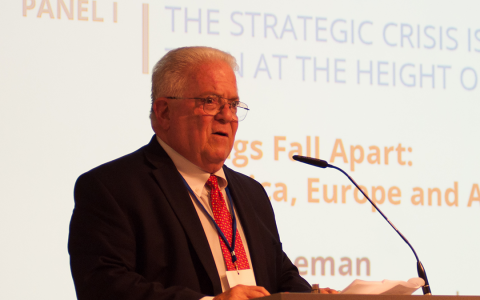 AMB. (ret) CHAS W. FREEMAN, JR: Helga, I’d like to thank you for that very inspiring set of opening remarks. We have entered a world in which, as William Butler Yeats put it in 1919: “Things fall apart; the center cannot hold; mere anarchy is loosed upon the world.” In Europe, in America, and in parts of Asia there is a sense of foreboding—an elemental unease about what is to come. There is vexing drift amidst political paralysis. Demagoguery is ascendant and the stench of fascism is in the air.
AMB. (ret) CHAS W. FREEMAN, JR: Helga, I’d like to thank you for that very inspiring set of opening remarks. We have entered a world in which, as William Butler Yeats put it in 1919: “Things fall apart; the center cannot hold; mere anarchy is loosed upon the world.” In Europe, in America, and in parts of Asia there is a sense of foreboding—an elemental unease about what is to come. There is vexing drift amidst political paralysis. Demagoguery is ascendant and the stench of fascism is in the air.
This is the global context in which China has proposed to integrate the entire Eurasian landmass with a network of roads, railroads, pipelines, telecommunications links, ports, airports, and industrial development zones. If China’s “One Belt, One Road” concept is realized, it will open a vast area to economic and intercultural exchange, reducing barriers to international cooperation in a 65-country zone with 70% of the world’s population, with over 40% of its GDP, generating well over half of its current economic growth.
In concept, the Belt and Road program, which is one of the major topics of this conference, is the largest set of engineering projects ever undertaken by humankind. Its potential to transform global geo-economics and politics is proportional to its scale.
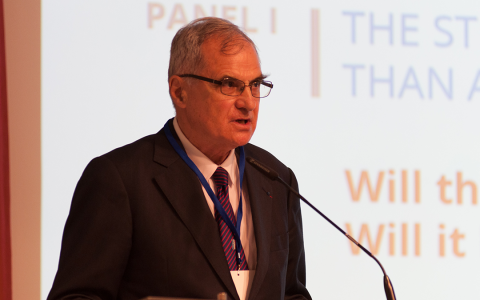 COL. (ret) ALAIN CORVEZ: I want to congratulate the Schiller Institute for organizing this conference at a critical moment when the threat of a nuclear war which would lead to the extinction of humanity becomes clearer every day, because of the concentration in the heart of Europe of weapons capable of destroying the planet within seconds. To respond to the reinforcements of U.S. strategic forces inside NATO on European territory, Russia was forced to deploy an equivalent arsenal of deterrence on its western borders. It’s therefore high time that the strategists of various countries, even those far from the European Theater, demand restraint and more wisdom from the heads of state of the entire world.
COL. (ret) ALAIN CORVEZ: I want to congratulate the Schiller Institute for organizing this conference at a critical moment when the threat of a nuclear war which would lead to the extinction of humanity becomes clearer every day, because of the concentration in the heart of Europe of weapons capable of destroying the planet within seconds. To respond to the reinforcements of U.S. strategic forces inside NATO on European territory, Russia was forced to deploy an equivalent arsenal of deterrence on its western borders. It’s therefore high time that the strategists of various countries, even those far from the European Theater, demand restraint and more wisdom from the heads of state of the entire world.
This is the purpose of this beneficial institute founded by Mrs. Helga Zepp-LaRouche, whom I wish to compliment personally.
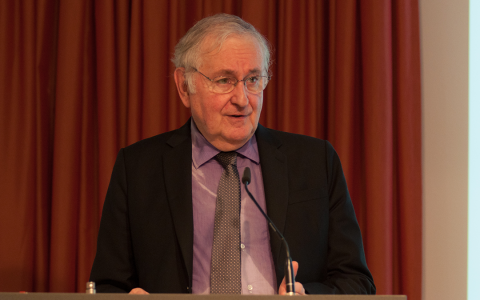 JACQUES CHEMINADE, French Presidential candidate: So, LaRouche thinking proceeds from the becoming, as a science which is the active principle of the economy. The trans-Atlantic financial system in which we are living, based on accumulation of money, is leading to the opposite, not to increasing the size of the physical economy, but to chaos and war, or, more precisely and more tragically, to a combination of both.
JACQUES CHEMINADE, French Presidential candidate: So, LaRouche thinking proceeds from the becoming, as a science which is the active principle of the economy. The trans-Atlantic financial system in which we are living, based on accumulation of money, is leading to the opposite, not to increasing the size of the physical economy, but to chaos and war, or, more precisely and more tragically, to a combination of both.
The preceding speakers have shown that the current world is more dangerous, yes, more dangerous, than it ever was during the height of the Cold War. Those proclaiming themselves “realists” and “reasonable,” while following the rules of the system, in reality contribute to its collapse by the mere fact that they operate inside the system without fighting it.
Now we have arrived at the point in history where systemic change, a just concept of economy and man, are necessary for the survival of all. Money has no intrinsic value. It is nothing but an instrument, acquiring value through what it promotes. From there on, what is the goal to reach?
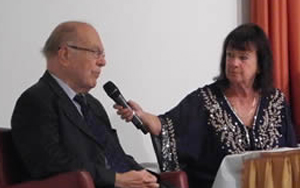 LYNDON LAROUCHE: First of all, we’re looking at this issue of man, as such—man’s ability to create higher levels of development of the human powers of mankind. The next thing is: how do we understand, how do we find things that are going to make mankind more successfully existent? That’s another question. All these things are simple, scientific questions. What we depend upon, is driving what we call “physical science,” and driving it, per capita, to a higher level, always.
LYNDON LAROUCHE: First of all, we’re looking at this issue of man, as such—man’s ability to create higher levels of development of the human powers of mankind. The next thing is: how do we understand, how do we find things that are going to make mankind more successfully existent? That’s another question. All these things are simple, scientific questions. What we depend upon, is driving what we call “physical science,” and driving it, per capita, to a higher level, always.
In that process, you have to define what the means is by which you’re going to do this. My concern is always to come up with a new technology, a more advanced technology, one which overturns and obviates the need for an existing technology. My specialty is concentrating on the revolution in the applicable technologies; and that is the only device by which I know that mankind can improve the requirements for mankind now.
 MARCO ZANNI, head of M5S delegation in the Eco. and Monetary Affairs Cttee. of the European Parliament: The European financial system is collapsing; it’s collapsing because of wrong policies brought about by European governments and by the European Union. Clearly, a first step—and we proposed one bill in the Italian Parliament and one in the European Parliament in the framework of the banking structure reform is restoring banking separation. We think that we have to set up a sort of modern European Glass-Steagall that will simplify the regulation on the banking system, and will make the separation between the core part of a bank and a speculative bank in order to create a banking system that is no longer focussed on speculation, on the financial system; but on the needs of the real economy, on the needs of people. This is the first step.
MARCO ZANNI, head of M5S delegation in the Eco. and Monetary Affairs Cttee. of the European Parliament: The European financial system is collapsing; it’s collapsing because of wrong policies brought about by European governments and by the European Union. Clearly, a first step—and we proposed one bill in the Italian Parliament and one in the European Parliament in the framework of the banking structure reform is restoring banking separation. We think that we have to set up a sort of modern European Glass-Steagall that will simplify the regulation on the banking system, and will make the separation between the core part of a bank and a speculative bank in order to create a banking system that is no longer focussed on speculation, on the financial system; but on the needs of the real economy, on the needs of people. This is the first step.
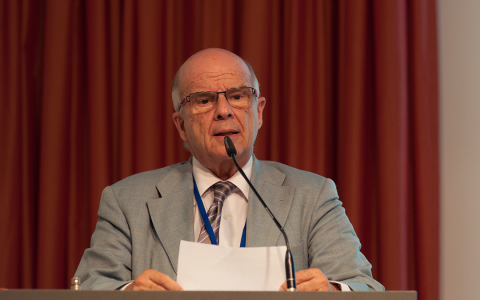 AMB. (ret) LEONIDAS CHRYSANTOPOULOS, Another threat facing humanity is the US animosity towards Russia, as if we were still in the Cold War period. This was discussed in the previous panel, but very roughly I would just say about it. A missile system is being set up to encircle Russia; and of course, Moscow is preparing a defense field to counter it. The EU embargo on Russia after the Ukrainian crisis is not at all helping the situation. Also, threats have been recently made by Obama against China and the need to restrict her economic power. With a collapsing EU and a USA looking for confrontation with Russia and China, a solution for humanity can be the BRICS initiative; which is the initiative of Brazil, Russia, India, China, and South Africa to pursue a policy of economic development for the benefit of humanity. They have created their own development bank to invest in the necessary development projects. China has established the Asia Infrastructure [Investment] Bank; joined by over 20 Asian nations as founding members, and has set up a Silk Road Development Fund.
AMB. (ret) LEONIDAS CHRYSANTOPOULOS, Another threat facing humanity is the US animosity towards Russia, as if we were still in the Cold War period. This was discussed in the previous panel, but very roughly I would just say about it. A missile system is being set up to encircle Russia; and of course, Moscow is preparing a defense field to counter it. The EU embargo on Russia after the Ukrainian crisis is not at all helping the situation. Also, threats have been recently made by Obama against China and the need to restrict her economic power. With a collapsing EU and a USA looking for confrontation with Russia and China, a solution for humanity can be the BRICS initiative; which is the initiative of Brazil, Russia, India, China, and South Africa to pursue a policy of economic development for the benefit of humanity. They have created their own development bank to invest in the necessary development projects. China has established the Asia Infrastructure [Investment] Bank; joined by over 20 Asian nations as founding members, and has set up a Silk Road Development Fund.
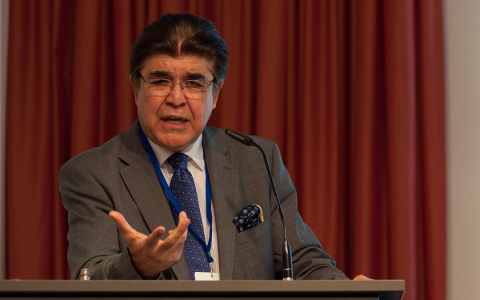 AMB. HAMID SIDIG, current Ambassador of Afghanistan to Germany: I would like to express my gratitude and honor to be part of this important event. Over the past 30 years, the Schiller Institute has played a significant role in promoting international discussion on major topics, and has shaped the future of our work. Since ancient times, the Silk Road has been a symbol of the commercial artery to connect Asia and Europe; creating wealth and cultural exchange to benefit all countries involved in this area. Our conference today—and I hope to build on this ancient tradition, by bringing together scientists and politicians to develop a New Silk Road; and begin the process of healing, integrating, and regenerating this very important region—Central Asia. Our vision is to create a secure and peaceful life for our region, which will allow thousands of refugees to return back to their homes and rebuild their communities again.
AMB. HAMID SIDIG, current Ambassador of Afghanistan to Germany: I would like to express my gratitude and honor to be part of this important event. Over the past 30 years, the Schiller Institute has played a significant role in promoting international discussion on major topics, and has shaped the future of our work. Since ancient times, the Silk Road has been a symbol of the commercial artery to connect Asia and Europe; creating wealth and cultural exchange to benefit all countries involved in this area. Our conference today—and I hope to build on this ancient tradition, by bringing together scientists and politicians to develop a New Silk Road; and begin the process of healing, integrating, and regenerating this very important region—Central Asia. Our vision is to create a secure and peaceful life for our region, which will allow thousands of refugees to return back to their homes and rebuild their communities again.
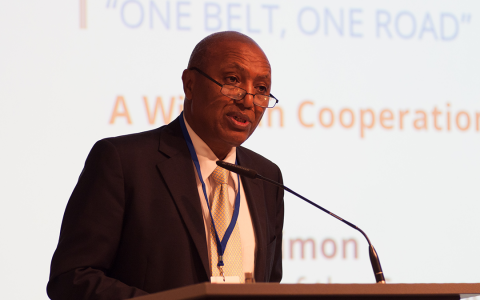 BEREKET SIMON, chairman of Commercial Bank of Ethiopia, advisor to PM: I would like to express my heartfelt sympathy and support to the people of Syria, Iraq, Libya, and the larger Middle Eastern and North African countries who are subjected to a wanton destruction as a result of a mistaken policy of regime change by some global powers. Allow me also to thank the Schiller Institute for inviting me to speak on a broad topical issue—the importance of the economic development of Ethiopia in the context of the New Silk Road and the greater African region.
BEREKET SIMON, chairman of Commercial Bank of Ethiopia, advisor to PM: I would like to express my heartfelt sympathy and support to the people of Syria, Iraq, Libya, and the larger Middle Eastern and North African countries who are subjected to a wanton destruction as a result of a mistaken policy of regime change by some global powers. Allow me also to thank the Schiller Institute for inviting me to speak on a broad topical issue—the importance of the economic development of Ethiopia in the context of the New Silk Road and the greater African region.
Dear Friends, Ethiopia considers China’s Silk Road economic projects and maritime Silk Road projects jointly known as One Belt, One Road as another milestone opportunity that could contribute to sustain its economic development together with all the countries in our region. We believe that the last decade or two have witnessed the resurgence of trade between Africa and the East. The New Silk Road would also further strengthen the mutual benefits of expanded trade between nations. This will apply to the relationship between Ethiopia and its traditional partners [inaud; 20:49]. Together with our neighbors in the region, we are determined to an Ethiopian, and indeed African, renaissance which can harness the new possibilities opened by developments like the New Silk Road. I thank you.
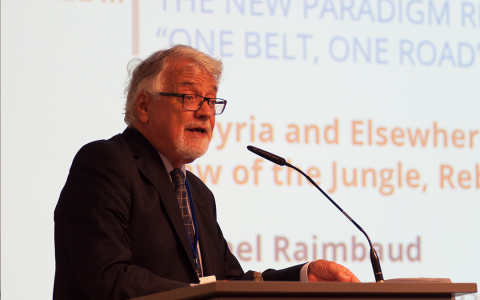 AMB. (ret) MICHEL RAIMBAUD: Good morning. I want to talk to you about Syria and the title of my intervention is “In Syria and Elsewhere, Against the War Party and the Law of the Jungle, We Have to Rebuild Peace and International Law”; these are my themes. First of all, the world today is in great danger of war; more than ever before. It’s going through a global crisis— that has been said already. One hears much about a new Cold War, which would lead us back to the old confrontation between the free world, so-called, the Axis of Good, and the totalitarian bloc, dubbed the Axis of Evil by George Bush.
AMB. (ret) MICHEL RAIMBAUD: Good morning. I want to talk to you about Syria and the title of my intervention is “In Syria and Elsewhere, Against the War Party and the Law of the Jungle, We Have to Rebuild Peace and International Law”; these are my themes. First of all, the world today is in great danger of war; more than ever before. It’s going through a global crisis— that has been said already. One hears much about a new Cold War, which would lead us back to the old confrontation between the free world, so-called, the Axis of Good, and the totalitarian bloc, dubbed the Axis of Evil by George Bush.
We have lift immediately the sanctions; if there’s a message I want to give you, these sanctions have to be lifted. It’s a crime of war; it’s a major crime of war. This has to be lifted right away; we have to fight for this.
Message from FOUAD AL-GHAFFARI; Chairman of Advisory Office for Coordination with BRICS, Yemen: Dear Mrs. Helga Zepp-LaRouche, the noble chairwoman of the Schiller Institute and the New Silk Road Lady; dear Mr. Hussein Askary, the Middle East coordinator of the Schiller Institute, Ladies and Gentlemen who are gathered in this conference here in Berlin today; I carry a great deal of joy and gratitude for you and for your team for the outstanding awareness achieved in my country about the New Silk Road and the World Land-Bridge, and the new economic system of the BRICS. All that awareness delivered special marks that is occurring through our advisory office, the rights to publish and distribute the Arabic of the EIR Special Report, “The New Silk Road Becomes the World Land-Bridge”; and printing 1000 copies for the Yemeni market.
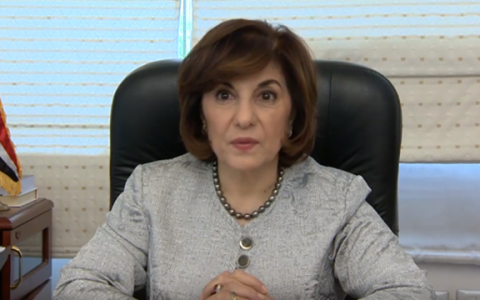 DR. BOUTHAINA SHAABAN; from the Presidency of Syria: If we need to create a world for all, if we need to create a peaceful world, if we need to create a prosperous world for all, we need to create a conceptual, intellectual concept of one world; we need to create a conceptual concept of the Silk Road. Not only an actual Silk Road, but an intellectual Silk Road. All of you know that Aleppo and Syria were extremely crucial in the ancient Silk Road that connected Asia to Europe. Syria and the Syrian people will be more than happy to be also very active in a New Silk Road, in a political, social, intellectual Silk Road that connects Asia to the West; that connects Eurasia to the West.
DR. BOUTHAINA SHAABAN; from the Presidency of Syria: If we need to create a world for all, if we need to create a peaceful world, if we need to create a prosperous world for all, we need to create a conceptual, intellectual concept of one world; we need to create a conceptual concept of the Silk Road. Not only an actual Silk Road, but an intellectual Silk Road. All of you know that Aleppo and Syria were extremely crucial in the ancient Silk Road that connected Asia to Europe. Syria and the Syrian people will be more than happy to be also very active in a New Silk Road, in a political, social, intellectual Silk Road that connects Asia to the West; that connects Eurasia to the West.
PROJECT PHOENIX video: Not only Aleppo, but all of Syria with its people, culture and artifacts, represents a unique and living testimony to the coexistence and continuity of different human civilizations. It is imperative that the world defend and preserve it; and when peace is established, make it the world capital for the dialogue of civilizations.
HELGA ZEPP-LAROUCHE: So, I think we should be fully conscious that in this present crisis lies a tremendous chance to reach a new Renaissance as significant, and maybe even more significant, than the change from the Middle Ages to the modern times. That if we break with the axioms of the globalization, of the deductive thinking, of all the things which have led to this crisis; and focus on the creativity of mankind as that which distinguishes us from other species, that many of us can probably live to see a world where each child is educated universally and that the normal condition of mankind will be genius. That that which is human will be fully developed, to have all the potentials developed of the human species as creative composers, scientists, engineers, extraordinary people discovering things which we doesn’t even know the question here of; like China going to the far side of the Moon. We will understand secrets of the Universe which we don’t even know yet to ask. And people will become better people. I believe that the true nature of human beings is good; that every human being has a capacity of limitless perfection and goodness of the soul. And to accomplish that, is within reach; and let’s work for it.

